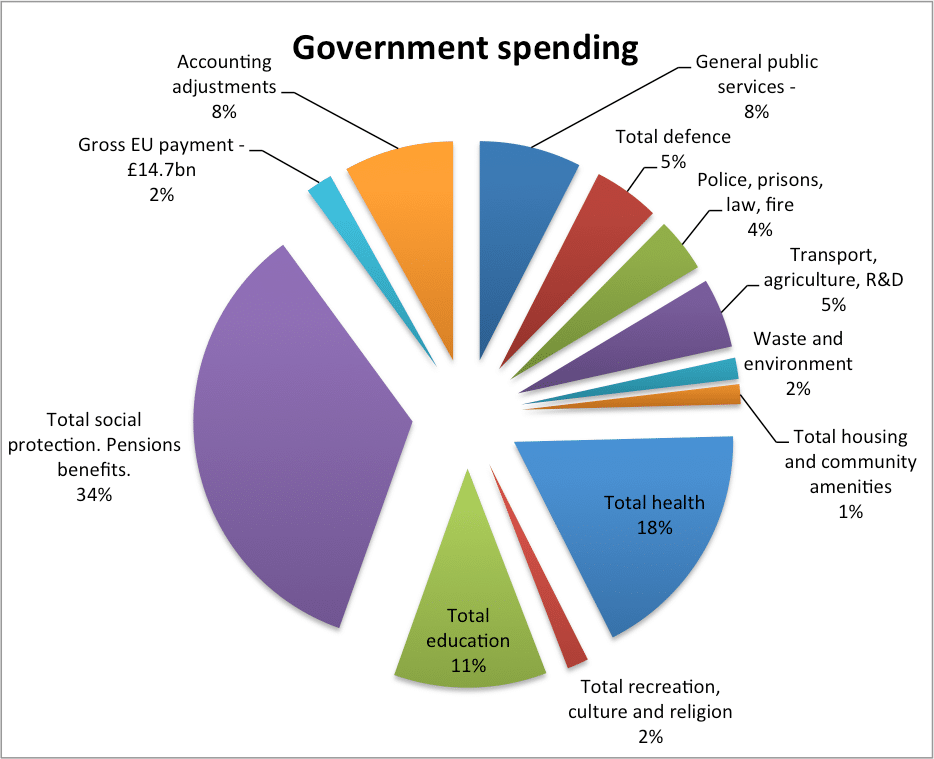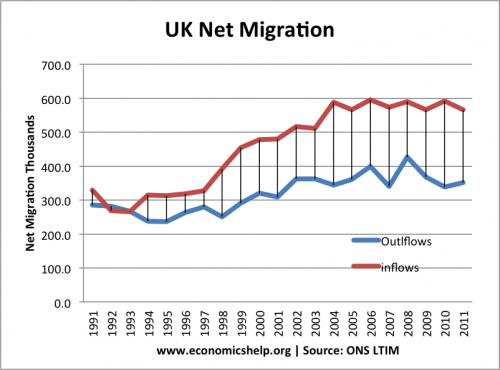Disadvantages of EU membership include:
- Cost. The costs of EU membership to the UK is £15bn gross (0.06% of GDP) – or £6.883 billion net. See UK government spending. (UKIP claim that the cost of EU membership in total amounts to £83bn gross if you include all possible costs, such as an ‘estimated’ £48bn of regulation costs – or £1,380 per head [1]. The ONS has estimated a net contribution cost of £7.1 bn. See actual cost of EU membership
- Inefficient policies. A large percentage (40%) of EU spending goes on the Common Agricultural Policy. For many years this distorted agricultural markets by placing minimum prices on food. This lead to higher prices for consumers and encouraging over-supply. Reforms to CAP have reduced, but not eliminated this wastage. A significant existing problem with CAP is that it has rewarded large land-owners, with little reflection of social benefit. See: Transfer of funds from poor to rich landowners (Guardian) Though the UK is guilty of rejecting limits on CAP.
- Problems of the Euro. Membership of the EU doesn’t necessarily mean membership of the Euro. But, the EU has placed great emphasis on the single currency. However, it has proved to have many problems and contributed to low rates of economic growth and high unemployment across the EU. Fortunately, the UK stayed out of the Euro. See: Problems of Euro.
- Pressure towards austerity. Since 2008, many southern European countries have faced pressure from the EU to pursue austerity – spending cuts to meet budget deficit targets, but in the middle of a recession these austerity measures have contributed to prolonged economic stagnation. In particular, Greece was forced by its creditors to accept austerity, when some economists have argued this is counter-productive.
- Net migration. Free movement of labour has caused problems of overcrowding in some UK cities. The UK’s population is set to rise to 70 million over the next decade, partly due to immigration (of which 50% is from EU and 50% from non-EU). Immigration has helped to push up house prices and led to congestion on roads. (See: immigration and housing) The concern is that in the EU, the UK is powerless to place a limit on immigration from Eastern Europe because free movement of labour is a cornerstone of the EU. See: Impact of immigration on UK economy
- More bureaucracy less democracy. It is argued that the EU has created extra layers of bureaucracy while taking away the decision-making process further from local communities. For example, the British Chambers of Commerce has estimated that the annual cost to the UK of EU regulation is £7.4bn. The introduction of Qualified majority voting (QMV) means that on many decisions votes can be taken against the public interest of a particular country.
Evaluation of these problems

- The cost of the EU is a relatively small percentage of overall UK government spending. (See: EU In perspective)
- The UK has received regional funds over the years, which has helped economic regeneration of areas like South Wales and North East.
- The CAP and other policies are in a long slow process of being reformed. If the UK stays in the EU, it could, in theory, help to promote policies which work in the long-term interest of the UK and reform inefficient policies like CAP.
- An estimated 3.5 million jobs are linked to trade with Europe. Some jobs may be threatened if tariff barriers were to rise outside the EU.
- The UK is the third-largest recipient of inward investment in the world. Access to the Single Market is one factor in encouraging this inward investment. The investment is important for UK economic growth and jobs.
- Some EU bureaucracy has been beneficial in promoting competition, e.g. forcing mobile phone networks to limit charging when using mobiles abroad.
- UK newspapers have tended to exaggerate and even misinform readers about ‘EU rules and regulation’. This is a list of Euro myths – where UK newspapers have blamed EU regulations, but it was actually inaccurate or misplaced.
- Issues like farming and fishing and the environment are global issues which need to be tackled within a European framework; it is insufficient to have just a national policy on fishing and the environment because the issues by nature require global co-operation, e.g. solve global warming, over-fishing.
- The EU Health Insurance Card enables EU citizens to receive emergency healthcare on the same terms as the citizens of the EU country they are visiting (often free). (Euro-movement)
- By staying out the Euro, the UK has retained independence over monetary policy, fiscal policy and the exchange rate. The UK doesn’t have the same pressure to pursue austerity as countries in the Eurozone have. This shows that the UK can combine membership of the EU with flexibility over economic policy.

- Migration works both ways. Many British people have emigrated to take advantage of opportunities elsewhere in Europe. An estimated 748,010 Britons live or work in the European Union (link). However, net migration has been running at around 200,000 a year since the early 2000s.
- EU migrants are net contributors to the UK Treasury. Although they cost the UK regarding demand for public services, they contribute relatively more in taxes. The main reason is that migrants are more likely to be of working age 20-40. Therefore, they need relatively less health care and no pensions. The UK native population is rapidly ageing – this places stress on public finances because of a greater need for health care and pensions. Without net migration, there would be a greater strain on public finances.
- The free movement of labour enables a more flexible labour market, with immigrants able to fill gaps in the UK labour market, such as nursing and plumbing. Also, the additional labour increases UK productive capacity and helps increase real GDP. (see the impact of the rising population) The large numbers of net migration to the UK in recent years may reflect a temporary situation of relatively higher growth in the UK than Europe and may subside when (if) the Eurozone recovers.
- Problems attributed to EU migration are more due to general government policy – e.g. cuts to share of GDP spent on health care.
Related

is important or determonal
it is important!!!!!!!!!
Only the un-elected Commission can initiate legislation.
In Parliament, any elected MP has that right.
Unelected you say. Yet all are put forward by their individual governments and ratified by the European Parliament. In both cases the individual government and Parliament are elected by us. In America not one member of The US cabinet is elected. All appointed by their elected President and we don’t call that undemocratic!
To fully understand how the EU works read The Great Deception by Christopher Booker. You can buy it on Amazon; it’s well worth a read. Every EU citizen should read it, it’s an education.
I’ve read that book and most of it is rank distortion designed to reinforce the reader’s pre-owned existing great and loathing of the EU, based on years of disinformation in the British press.
I know a far better way to understand how the EU works: I studied law at aUK university and obtained a first in EU law. Unfortunately for ignorant Eurosceptics, this will be an objective and non-partisan exploration of the ideals and legal mechanisms that drive the EU, so on the ends you’ll Emma up begrudgingly accepting that the EU is in principle a very good idea.
50% of net migration from Non-Eu is the best reason for Brexit. You don’t have to study law from any university to know that that is a good thing.
vote stay
this article helped me very much with my geography article thanks
We all need more information to understand the true pros and cons of membership. I still feel the Remain camp underestimate the Leave camp.
I am a proud european and even prouder Brit.
However, I do not want to be governed by a federalised EU.
The EU could ahve headed off he Eurosceptism that has wept the Continet for many, many years, long before the UK called for a referdum and an ‘Article 50’ event.
The EU, or the EU-SSR Brussels Politburo as many Eurosceptics call it, have not really reformed its institutions. it is far too slow. With various EU Member States like greece, italy, Spain, Portugal etc having financial difficulties, all this could eventually cause the EU to crack.
The EU is like a an old piss stained mattress coming aprt at teh seams, and no amount of ‘papering over the cracks’ can now hide this nor the problem with mass migration from far off hot, sweaty, camel infested places.
I don’t know of any hot, sweaty camel infested places in the 28 countries of the EU or indeed the 4 EEA ones either. Could you enlighten me please?
The only bit of the EU that is unelected is the bureaucracy, aka a civil service. The only bits that are unelected in our system are the Lords and the Civil service, aka a bureaucracy.
Arguably our system is less democratic the the EU
A Member of the European Parliament, working in one of the parliamentary committees, draws up a report on a proposal for a ‘legislative text’ presented by the European Commission, the only institution empowered to initiate legislation. The commission are unelected therefore an unelected body is responsible for the laws in the EU and the MEPs who are elected can only make comment. I think this negates your comment as our civil servants cannot bring in laws and while the unelected Lords can suggest a bill they cannot ultimately hold up the lawmaking process if the Commons don’t approve of their suggestion. I think the uk legislature is theirfore more democratic. Only if we could put an x on a balot paper to vote in the commission would it be otherwise.
Democracy only exists when people receive impartial and factually correct information! The Uk has concentrated media ownership (Murdoch, Barclays Bros, lord Harmsworth), 80% of which is right wing. It has been telling half truths, lying and dumbing down for decades. Electors voted on this information. Poor democracy or democracy in name only?
Agreed, but whats important is we can vote out of office our MP’s and change laws – in the EU, even being a ‘bigger’ member state, with our 8% say (split between factions) in the EU Parliament, we ARE being ruled by a foreign power. Totally unacceptable.
Like empires of the past it will collapse at some point in future.
Empires of the past! The world decides in blocs now! The United States of america is fine but the United States of Europe is not! Churchill wanted a United States of Europe. Now the Uk has left Eu as a small state of 66million people how does it propose to negotiate as equals with 1.3bn Chinese and 1.3bn Indians, the USA being the worlds biggest economy and the armed To teeth along with Russia! Lots keep talking of Australia, New Zealand, Singapore – geographically far away – how will that square with a greener cleaner future? They all have much smaller populations than UK too! The Uk thinks it is bigger than it is, it couldn’t wait to get into EU and now it wants to be Singapore on Thames. Leaving won’t benefit the majority of Brits!
ur mom smells like pooppoo